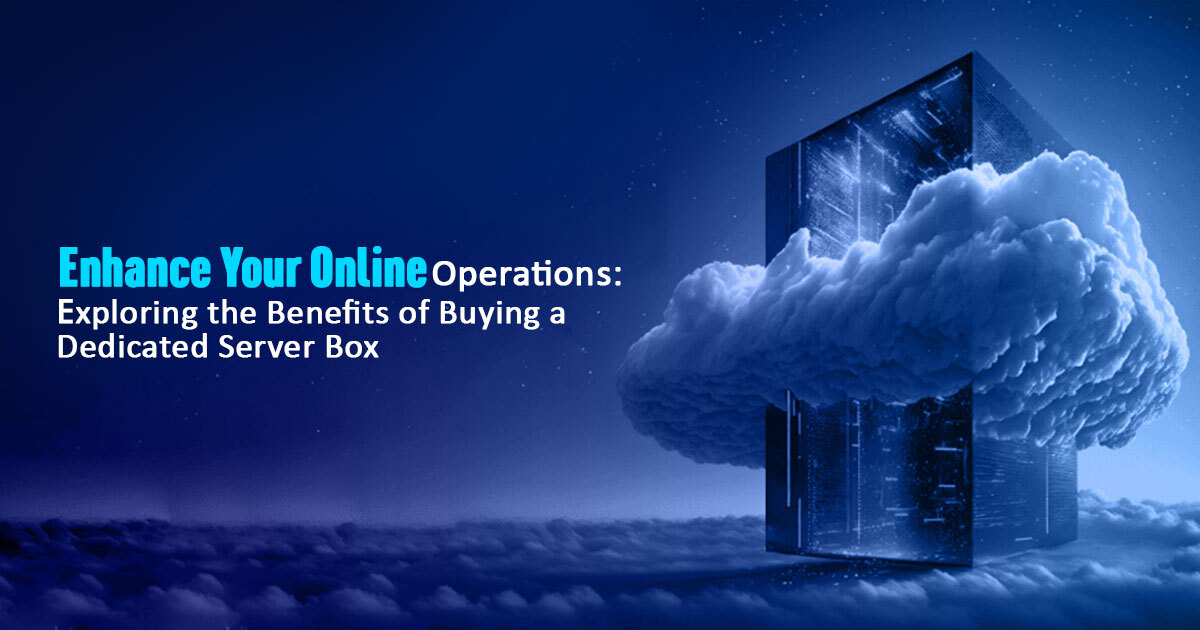
In today’s rapidly evolving digital landscape, businesses and individuals alike are increasingly reliant on robust online operations. Whether you’re running a website, hosting applications, or managing critical data, having a reliable hosting solution is paramount. One option that stands out for its performance and control is the dedicated server box. Let’s delve into the benefits and considerations of buying a dedicated server to elevate your online presence.
Understanding Dedicated Server Boxes
A dedicated server box is a physical server exclusively dedicated to a single user or organization. Unlike shared hosting, where multiple users share server resources, a dedicated server ensures that all computing power, storage, and bandwidth are dedicated to your specific needs. This offers unparalleled performance, security, and customization options.
Key Benefits of Dedicated Servers
Enhanced Performance:
A dedicated server provides unparalleled performance, ensuring that your website or applications run smoothly even during peak traffic periods. With dedicated resources, you have the processing power and memory required for optimal performance.
Complete Control:
Owning a dedicated server means having full control over the server environment. You can customize software, install specific applications, and configure settings to meet your exact requirements. This level of control is crucial for businesses with specific security or compliance needs.
Improved Security:
Security is a top priority in the digital realm. Dedicated servers offer a more secure environment compared to shared hosting. You have full control over security measures, including firewall settings, access permissions, and encryption protocols.
Scalability:
As your business grows, so do your hosting needs. Dedicated servers provide scalability, allowing you to easily upgrade hardware components such as CPU, RAM, and storage to accommodate increasing demands.
Unique IP Address:
A dedicated server comes with its own unique IP address. This is essential for businesses that require SSL certificates for secure online transactions, boosting trust among users and improving SEO rankings.
Exploring Dedicated Server Options
Hardware Specifications:
Consider the hardware specifications that align with your requirements. Assess the CPU power, RAM, storage capacity, and data transfer rates to ensure they meet your current and future needs.
Operating System Choices:
Evaluate the available operating systems. Whether you prefer a Linux-based system for open-source flexibility or a Windows environment for specific applications, choose the OS that best suits your objectives.
Managed vs. Unmanaged:
Decide whether you want a managed or unmanaged dedicated server. A managed server comes with professional support for tasks like maintenance, updates, and security. Unmanaged servers provide more control but require you to handle these aspects.
Data Center Location:
The physical location of the data center hosting your dedicated server matters. Choose a location that ensures low latency and high availability for your target audience.
Making the Purchase
Reputable Providers:
Select a reputable hosting provider with a track record of reliability and customer satisfaction. Research reviews, ask for recommendations, and ensure the provider offers 24/7 customer support.
Service Level Agreements (SLAs):
Carefully review the SLAs provided by the hosting provider. Understand the terms related to uptime guarantees, customer support response times, and any penalties for breaches of service.
Cost Considerations:
While dedicated servers offer superior performance, they come at a cost. Compare pricing plans, taking into account factors such as hardware specifications, support services, and additional features.
Migration Assistance:
If you’re transitioning from another hosting solution, check whether the provider offers migration assistance. A smooth transition is crucial to minimizing downtime and disruptions to your online operations.
In conclusion, investing in a dedicated server box can significantly enhance your online operations, providing the performance, control, and security necessary for success in the digital realm. By carefully exploring options and making an informed purchase, you can position your online presence for optimal growth and reliability.
FAQs
- What is a dedicated server box, and why should I consider using one for my website?
A dedicated server box is a physical server exclusively dedicated to a single user or organization. Choosing a dedicated server ensures enhanced performance, complete control over the server environment, improved security, scalability, and a unique IP address. It’s an ideal solution for businesses or individuals with specific hosting needs and a focus on optimal performance.
- How does a dedicated server improve website performance compared to other hosting options?
Unlike shared hosting, where resources are divided among multiple users, a dedicated server provides exclusive access to computing power, storage, and bandwidth. This results in enhanced performance as your website or applications can utilize the full capacity of the server, ensuring smooth operation even during peak traffic periods.
- What factors should I consider when choosing a dedicated server, and how do I determine the right specifications for my needs?
Consider the hardware specifications, including CPU power, RAM, storage capacity, and data transfer rates. Evaluate your current and future needs to determine the appropriate specifications. Additionally, choose the operating system that aligns with your preferences, decide between managed and unmanaged options, and consider the location of the data center for optimal performance.
- Are dedicated servers suitable for small businesses, or are they more geared toward larger enterprises?
Dedicated servers are suitable for businesses of all sizes. While larger enterprises often leverage dedicated servers for their robust capabilities and customization options, small businesses can benefit from the enhanced performance, security, and control that dedicated servers provide. The key is to choose a server that aligns with the specific needs and growth plans of your business.
- How do I migrate to a dedicated server, and what kind of support can I expect during the transition?
Migrating to a dedicated server involves careful planning and execution. Reputable hosting providers often offer migration assistance to ensure a smooth transition. This may include guidance on transferring data, configuring settings, and minimizing downtime. Before making the move, it’s essential to communicate with the hosting provider to understand the level of support available and any potential impact on your online operations.